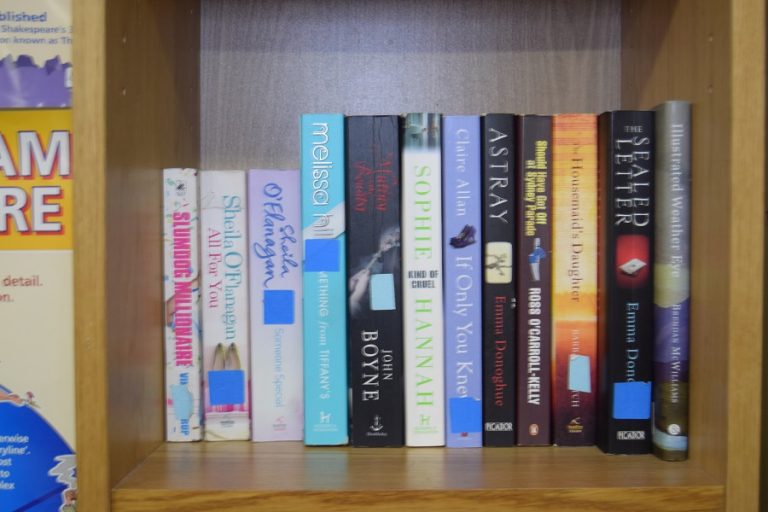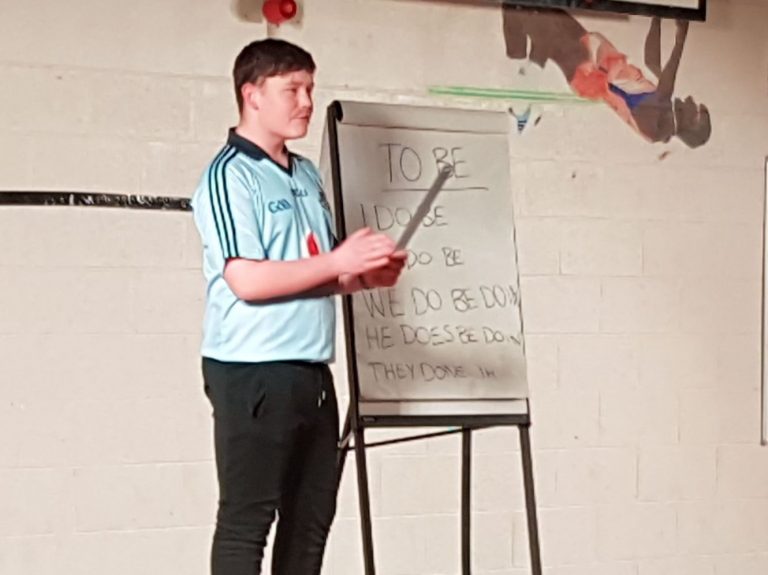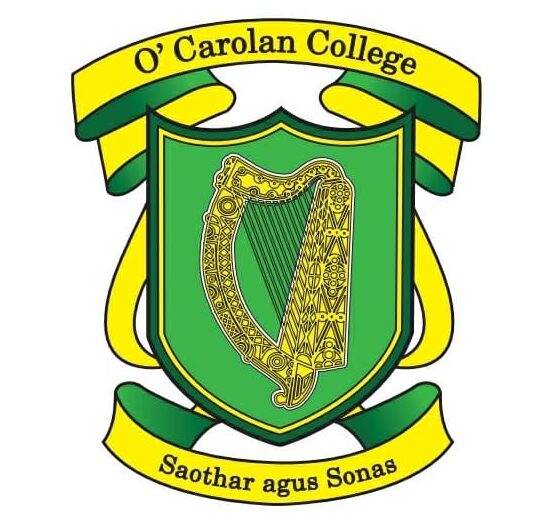

Many competitions were held at class level throughout the year: quizzes, poetry writing, book reviews and creative writing and entries presented in the form of posters, newspapers, advertisements and wall charts were displayed at the school’s Open Night. During term time students’ projects, reviews, poetry and media displays are exhibited in classrooms to acknowledge and celebrate their progress and creativity.
Core texts studied this year included:
- First Years: Skellig, Wonder, Girl Missing, Spirals
- Second & Third Years: Crescents, Blood Brothers, Of Mice and Men, Romeo and Juliet, Stone Cold, Trash, The Weight of Water, Son of Rambow, E.T
- Transition Year: A Monster Calls, Foster, Whiplash, Rubicon.
- Fifth Year: Othello, This is Poetry, Rosie, Miss Emily.
- Sixth Year: The Tempest, Pride, The Spinning Heart, By The Bog of Cats, Room, This is Poetry, Excellence in English.
Provision of the Subject
English is a compulsory subject which is studied at both Junior and Senior Cycle, with many students receiving extra tuition and guidance from the Learning Support Team. During Junior Cycle and Transition Year, classes are grouped according to the principle of mixed ability. Students are streamed at the beginning of fifth year and grouped according to Junior Cycle Exam results. Concurrent senior classes are timetabled in order to allow greater opportunities for shared activities and the sharing of ideas and resources among teachers. The English Department houses its own syllabi, videos, DVDs, material from the Department of Education and Skills, in-service resources etc.
Planning, Preparation and Resources
A number of formal and many informal meetings were held during the year to choose texts, plan and review work and progress and to examine the report by the Department of Education and Skills. As a department, we are extremely encouraged by the overall standard of results and the large number of students taking Higher Level English.
While our long-term plan is in accordance with the guidelines set down by the Department of Education and Skills, we are pleased that time is made available to revise and develop our own English Policy/Subject Plan and to allow ongoing research and reviews.
Teaching and Learning
Areas covered during the Junior Cycle include creative and functional writing, media studies, fiction, drama, poetry, film studies, debating, project work, comprehension and response to previously unseen texts.
At Junior Cycle the English Department has continued the rollout of the JCPA – Junior Certificate Profile of Achievement. Students in second and third year present the Oral Presentation and Portfolio of Written Work Classroom Based Assessments (CBAs) respectively.
This has been an exciting time for the English Dept. introducing new methodologies to our teaching and learning. The students have grasped the new concepts well and we look forward to excellent results for English in September.
In Transition Year the objective is to afford students the opportunity to develop a more personal appreciation of English language and literature. Focus is maintained on reading, writing, and the study of drama, fiction and poetry. Some areas covered this year included review writing, letter writing, public speaking, debating, improvised drama, film studies and creative writing.
During Senior Cycle, students concentrate on comparative studies of novels, plays and films, poetry, language genres and an in-depth study of a single text. Pupils’ work and progress is assessed through the setting and correction of homework, project work and ongoing class tests. House exams are taken at Christmas by all. In May, exams are taken by those not sitting state exams. These are set and marked by class teachers.
Many competitions were held at class level throughout the year: quizzes, poetry writing, book reviews and creative writing and entries presented in the form of posters, newspapers, advertisements and wall charts are displayed at the school’s Open Night. During term time students’ projects, reviews, poetry and media displays are exhibited in classrooms to acknowledge and celebrate their progress and creativity. There is a book club running once a week for all students. Digital screens display daily news and book recommendations.
Core texts studied this year include:
First Year: Foster, The Hunger Games, Private Peaceful, Girl Missing, Fire and Ice.
Second and Third Year: Fire and Ice 2 Of Mice and Men, The Merchant of Venice, The Weight of Water, E.T., Trash, Sing Street, Hunt for the Wilderpeople
Transition Year: A Monster Calls, The Help, By the Bog of Cats, Bridging the Gap, Whiplash.
Fifth Year: King Lear, This is Poetry, The Shawshank Redemption, Sive, Small Things Like These
Sixth Year: Hamlet, Room, Philadelphia, Here I Come!, Rosie
* Past exam papers and Study Clix were utilised by Sixth Years in preparation for the state
Lorem ipsum dolor sit amet, consectetur adipiscing elit. Ut elit tellus, luctus nec ullamcorper mattis, pulvinar dapibus leo.
